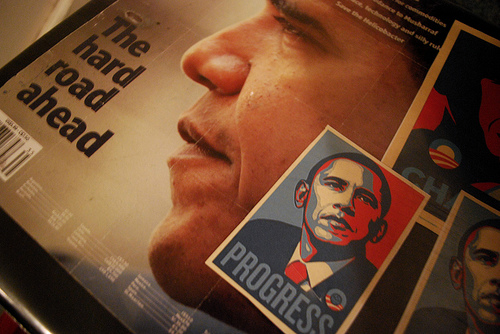Change the conversation, support rabble.ca today.
The Economist, the famous British magazine, in its first issues of 2013, ran on its cover a picture of U.S. President Obama wearing a striped shirt and a beret. It was a joke and a criticism directed towards Obama’s politics.
In simple words, The Economist was clearly saying that the U.S. was becoming another version of France, a country with a long and strong history of social programs.
Of course, it didn’t take long to have all the French media unleashing their wrath against those bad ‘English’ people with horrible taste.
The main point of the conservative right-leaning magazine was to pursue the same trend, started earlier in the U.S., of portraying Obama as a socialist and making fun of American politicians and their mishandling of the “fiscal cliff”.
I find it very strange how a supposedly serious magazine, read by the world elite, falls into these simplistic stereotypes and this sort of misinformation. Not because I am particularly fond of French economic programs but because it is simply wrong to say that Obama is a socialist president.
Since he arrived at the White House, Obama has continued many of the economic policies of his infamous predecessor. For instance, Obama appointed Ben Bernanke, the Federal Reserve chairman, for another term. This alone was a signal to mega corporations and to Wall Street actors that the fiscal and monetary policies of his predecessor would survive. Moreover, the $800-billion stimulus package Obama was quick to offer immediately after his election was not meant to help the poor, or help workers who lost their houses due to the financial crisis, but rather it was intended to bail out corporations and banks who until then didn’t take any concrete steps to regulate their ‘generous’ bonus payments to their CEOs and other top executives.
Even Obamacare, the medical insurance system that is still so controversial in the U.S., has nothing to rival the French program. In a nutshell, this system will work with private companies. So it is not the federal government who would fund this program; it is the individuals’ responsibility to buy a policy through private insurers.
So far, I simply can’t understand how all these economic policies under Obama would qualify him as a socialist.
What about the never-ending soap opera-type ‘drama’ between Republicans and Democrats on how to reduce the U.S. deficit in order to avoid the so-called “fiscal cliff”? Wasn’t that concrete proof that the Obama administration was hurting the rich and helping the poor? Isn’t that another indication that America is following in the steps of France where the failed attempt of Francois Holland to increase tax rates for the rich was aborted by the French Senate in the midst of another ugly public tantrum by the famous French actor Gerard Depardieu?
First of all, I am not sure of the longevity of this fragile agreement between Obama and Boehner, the Republican White House speaker. This agreement can implode in the near future or used as a political carrot for Obama. Second, Boehner offered to support a ‘symbolic’ tax increase on the super-rich in return for massive cuts in social entitlement programs. Indeed, as a counterpart to the tax increase, the Republicans got the promise to see $1 trillion in cuts in the federal health-care programs for the elderly and the poor, Medicare and Medicaid, and the federal retirement benefit program. Basically, it is a loss-loss situation where the relative burden on the rich will be transferred on to the poor!
Finally, the slow dismantling of union organizations from the labour scene, first in the state of Indiana and then in Michigan (under the indifferent watch of Obama), comes to refute the false message of the Economist and right-wing think-tanks with respect to the ‘true colours’ of Obama.
President Obama is nothing more than a president of a failing empire stumbling in the dark, trying to save the ship of capitalism with small wood patchworks and some rusted nails. Once again, The Economist got it all wrong!
Monia Mazigh was born and raised in Tunisia and immigrated to Canada in 1991. Mazigh was catapulted onto the public stage in 2002 when her husband, Maher Arar, was deported to Syria where he was tortured and held without charge for over a year. She campaigned tirelessly for his release. Mazigh holds a PhD in finance from McGill University. In 2008, she published a memoir, Hope and Despair, about her pursuit of justice, and in 2011, a novel in French, Miroirs et mirages.



